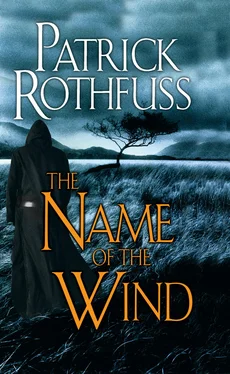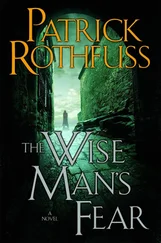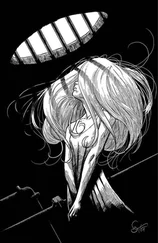He was dressed simply: black long-sleeved shirt tucked into black pants; black pants tucked into soft black boots. His face was sharp and delicate, almost beautiful, with striking blue eyes.
He carried a jug to the bar, walking with a strange and not unpleasant grace. “One customer?” he said reproachfully. “You couldn’t get it yourself? You pulled me away from Celum Tinture . You’ve been harping on me to read it for nearly a month now.”
“Bast, do you know what they do to students at the University who eavesdrop on their teachers?” Kvothe asked archly.
Bast put a hand on his chest and began to protest his innocence.
“Bast . . .” Kvothe gave him a stern look.
Bast closed his mouth and for a moment looked as if he was about to try and offer some explanation, then his shoulders slumped. “How did you know?”
Kvothe chuckled. “You’ve been avoiding that book for a mortal age. Either you had suddenly become an exceptionally dedicated student, or you were doing something incriminating.”
“What do they do to students at the University who eavesdrop?” Bast asked curiously.
“I haven’t the slightest idea, I was never caught. I think making you sit and listen to the rest of my story should be punishment enough. But I forget myself,” Kvothe said, gesturing to the common room. “We are neglecting our guest.”
Chronicler seemed anything but bored. As soon as Bast entered the room, Chronicler began to watch him curiously. As the conversation continued, Chronicler’s expression had grown by degrees more puzzled and more intent.
In fairness, something ought to be said about Bast. At first glance, he looked to be an average, if attractive, young man. But there was something different about him. For instance, he wore soft black leather boots. At least, if you looked at him that’s what you saw. But if you happened to catch a glimpse of him from the corner of your eye, and if he were standing in the right type of shadow, you might see something else entirely.
And if you had the right sort of mind, the sort of mind that actually sees what it looks at, you might notice that his eyes were odd. If your mind had the rare talent of not being fooled by its own expectations, you might notice something else about them, something strange and wonderful.
Because of this, Chronicler had been staring at Kvothe’s young student, trying to decide what was different about him. By the time their conversation was through, Chronicler’s gaze would be considered intense at the very least, and rude by most. When Bast finally turned from the bar, Chronicler’s eyes widened perceptibly, and the color drained from his already pale face.
Chronicler reached inside his shirt and tugged something from around his neck. He set it on the table at arm’s length, between himself and Bast. All this was done in half a second, and his eyes never left the dark-haired young man at the bar. Chronicler’s face was calm as he pressed the metal disk firmly onto the table with two fingers.
“Iron,” he said. His voice sounding with strange resonance, as if it were an order to be obeyed.
Bast doubled over as if punched in the stomach, baring his teeth and making a noise halfway between a growl and a scream. Moving with an unnatural, sinuous speed, he drew one hand back to the side of his head and tensed himself to spring.
It all happened in the time it takes to draw a sharp breath. Still, somehow, Kvothe’s long-fingered hand caught Bast’s wrist. Unaware or uncaring, Bast leaped toward Chronicler only to be brought up short, as if Kvothe’s hand were a shackle. Bast struggled furiously to free himself, but Kvothe stood behind the bar, arm outstretched, motionless as steel or stone.
“Stop!” Kvothe’s voice struck the air like a commandment, and in the stillness that followed, his words were sharp and angry. “I will have no fighting among my friends. I have lost enough without that.” His eyes caught Chronicler. “Undo that, or I will break it.”
Chronicler paused, shaken. Then his mouth moved silently, and with a slight tremor he drew his hand away from the circle of dull metal that lay upon the table.
Tension poured out of Bast, and for a moment he hung limply as a rag doll from the wrist Kvothe still held, standing behind the bar. Shakily, Bast managed to find his feet and lean against the bar. Kvothe gave him a long, searching look, then released his wrist.
Bast slumped onto the stool without taking his eyes from Chronicler. He moved gingerly, like a man with a tender wound.
And he had changed. The eyes that watched Chronicler were still a striking ocean blue, but now they showed themselves to be all one color, like gems or deep forest pools, and his soft leather boots had been replaced with graceful cloven hooves.
Kvothe motioned Chronicler forward imperiously, then turned to grab two thick glasses and a bottle seemingly at random. He set the glasses down as Bast and Chronicler eyed each other uneasily.
“Now,” Kvothe said angrily, “you’ve both acted understandably, but that does not by any means mean that either of you has behaved well. So, we might as well start over altogether.”
He drew a deep breath. “Bast, let me introduce you to Devan Lochees, also known as Chronicler. By all accounts a great teller, rememberer, and recorder of stories. In addition, unless I have suddenly lost all my wit, an accomplished member of the Arcanum, at least Re’lar, and one of perhaps two score people in the world who knows the name of iron.
“However,” Kvothe continued, “in spite of these accolades he seems to be a bit innocent of the ways of the world. As demonstrated by his plentiful lack of wit in making a near-suicidal attack on what I guess is the first of the folk he has ever had the luck to see.”
Chronicler stood impassively throughout the introduction, watching Bast as if he were a snake.
“Chronicler, I would like you to meet Bastas, son of Remmen, Prince of Twilight and the Telwyth Mael. The brightest, which is to say the only student I’ve had the misfortune to teach. Glamourer, bartender, and, not last, my friend.
“Who, over the course of a hundred and fifty years of life, not to mention nearly two years of my personal tutelage, has managed to avoid learning a few important facts. The first being this: attacking a member of the Arcanum skilled enough to make a binding of iron is foolish.”
“He attacked me!” said Bast hotly.
Kvothe looked at him coolly. “I didn’t say it was unjustified. I said it was foolish.”
“I would have won.”
“Very likely. But you would have been hurt, and he would be hurt or dead. Do you remember that I had introduced him as my guest?”
Bast was silent. His expression remained belligerent.
“Now,” said Kvothe with a brittle cheerfulness. “You’ve been introduced.”
“Pleased,” Bast said icily.
“Likewise,” Chronicler returned.
“There is no reason for you two to be anything other than friends,” Kvothe continued, an edge creeping into his voice. “And that is not how friends greet each other.”
Bast and Chronicler stared at each other, neither moved.
Kvothe’s voice grew quiet, “If you do not stop this foolishness, you may both leave now. One of you will be left with a slim sliver of story, and the other can search out a new teacher. If there is one thing I will not abide, it is the folly of a willful pride.”
Something about the low intensity of Kvothe’s voice broke the stare between them. And when they turned to look at him it seemed that someone very different was standing behind the bar. The jovial innkeeper was gone, and in his place stood someone dark and fierce.
He’s so young, Chronicler marveled. He can’t be more than twenty-five. Why didn’t I see it before? He could break me in his hands like a kindling stick. How did I ever mistake him for an innkeeper, even for a moment?
Читать дальше











